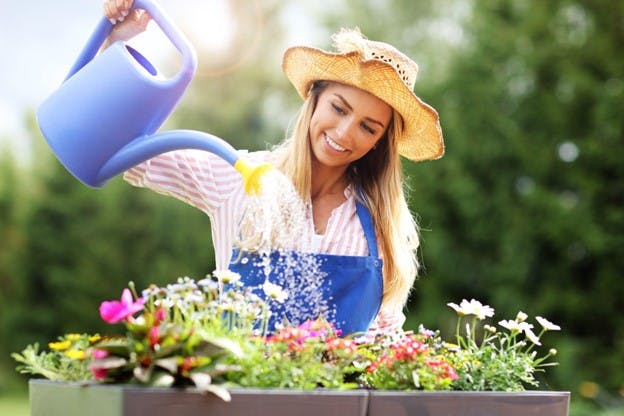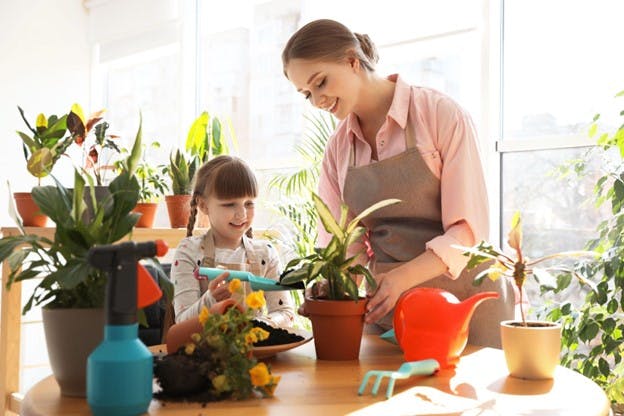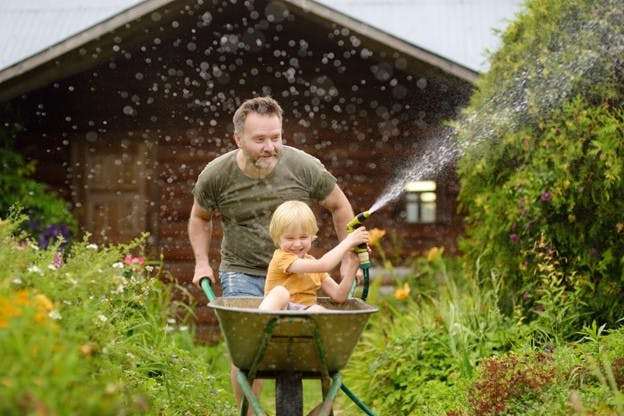September 2023
Why Should I Use Filtered Water for Plants?
A few well-placed houseplants can change the whole feel of a room. They can make a space feel more inviting and brighten everyone’s mood. Besides their aesthetic value, plants enrich the air with oxygen and are even known to reduce stress — unless you struggle to keep them alive.
While indoor plants offer many benefits, they can be temperamental roommates. They demand just the right balance of natural light, temperature, humidity, fertilizer, and water — and at just the right times — or else.
Sometimes, even when you think you’ve done everything right, they don’t flourish in quite the way you’d want them to. If you’ve ever wondered why you can’t keep your houseplants happy and green, it could be because of the water you’re giving them.
Some houseplants an be very sensitive to contaminants in tap water like chlorine, fluoride, and hard water minerals. This begs the question, should I use filtered water for plants?
Root yourself in while we take a deep dive into the significance of water quality for your plant friends. We’ll look at some types of water they might enjoy and explore various water filtration methods — and who knows? By the end you just discover your hidden green thumb!
Should I Water My Plants with Filtered Water?
Yes, filtered water for plants is best.
There are thousands of plant species out there and they all have unique needs. If you want them to thrive under your care, you’ll have to know which potentially harmful chemicals in your tap water they are sensitive to. Or you can just remove the impurities from your water supply through filtration.
Generally speaking, if you’re watering plants with unfiltered water, they probably won’t wilt in disapproval the first time. But plants live in soil which can build up impurities over time and lead to dead plants.
What Tap Water Contaminants Are Bad for Plants?
Tap water can have hundreds of contaminants in it depending on the source of water and how it's treated. Home water filtration systems are designed to remove many of these contaminants before they reach your glass or the roots of your plants. But if you don’t have a high-quality water filter, which of these common contaminants are the most harmful to your potted pals?
Chlorine and Chloramines
Chlorine is a common water disinfectant used to kill microorganisms in drinking water. While many plants can withstand chlorine, it may brown the tips of their leaves and kill the soil's beneficial microorganisms over time.
Luckily, chlorine is pretty easy to remove from your water by using most standard activated carbon water filters. You can also leave chlorinated water uncovered in a bucket for 24 hours and the chlorine will evaporate out.
Chloramines are another common water disinfectant. These aren’t removed quite as easily as chlorine. If your water supplier is using chloramines, you’ll need a catalytic carbon filter to remove it from your plant’s water.
Heavy Metals
Heavy metals like lead, iron, and copper show up often in tap water. This can be from either natural sources or from old pipes. While it’s not great for human health, for plants, it could be growth stunting or even deadly.
Heavy metals can be removed from water using reverse osmosis or by using special filter media like that found in the UPSTREAM™ 4-Stage Whole Home Water Filter.
Fluoride
In the United States and Canada, many public water suppliers add fluoride for dental health. While it’s shown to reduce cavities in teeth, fluoride-sensitive plants like spider plants and dracaenas would rather do without it. Fluoride will cause brown spots to come up on their leaves that can’t be healed.
Fluoride can be removed using a reverse osmosis filter. If your water filter doesn’t use reverse osmosis, try using rainwater whenever possible with these plants or water captured from a dehumidifier.
Nitrates and Nitrogen
Nitrates are vital for plants to grow. It’s even a key ingredient in many fertilizers. However, it’s easy for soil to become imbalanced with too much nitrogen, which can harm your plants. When a plant is overfed nitrates it can damage the leaves, attract insects, and cause the plant to favor more foliage over fruit or flowering. In severe cases, it can kill the plant.
Many tap water sources have a high concentration of nitrates from farm runoff. If you have too much nitrate in your tap water, reverse osmosis filters are the best way to get rid of it. Most other filter types won’t work.
Is Distilled Water or Filtered Water for Plants Better?
Both distilled and filtered water for plants are better options than tap water, however, filtered water is usually preferred. Distillation is a powerful water purification process that involves boiling water and capturing the steam. It removes almost all contaminants from your water. Unfortunately, some of those contaminants are natural minerals and nutrients that encourage plant growth.
Filtering water, on the other hand, takes out the bad stuff but leaves in a lot of what you want to keep. The exception to this is if your water is fluoridated and your plants are sensitive to fluoride. Distillation is one of the few water purification methods that removes fluoride from water. Normal activated carbon filters and pitcher filters won’t remove fluoride. Boiling water also won’t remove it.
But even if fluoride is your issue, a much more accessible option for removal is to use a reverse osmosis water filter. It can fit right under your sink and provide some of the highest quality drinking water for both you and your plants.
Is Softened Water Safe for Watering Plants?
There’s a big debate about watering houseplants with softened water among the green thumbs. Water softeners remove calcium and magnesium ions from your water. Not only are these two minerals often seen as good for plants, but in order to remove them, water softeners use a small amount of salt. Salt is traditionally bad for plants and can damage soil.
While the concentration of salt in softened water is very low, over time it can build up in the soil and cause problems. For potted plants, you may need to change to soil more often to protect them.
Another issue is that removing hard water minerals from water lowers its pH level. While this is great for some plants that enjoy an acidic environment, for plants that like a more alkaline environment, it could be damaging. Knowing what type of environment your plants do well in will help you answer whether water softeners are good for plants.
If you are concerned about water softeners but still want to enjoy the benefits of softer water in your home, a salt-free water conditioner is your answer. As the name suggests, they don’t use salt. They don’t remove the beneficial calcium and magnesium ions either. Instead, they change the minerals so they don’t stick to your surfaces.
Is It OK to Give Plants Purified Water?
Purified water is fine to give to plants. However, you may need to adjust the way you fertilize them. Water purification is usually done through reverse osmosis or distillation. Both processes can remove beneficial nutrients from water, leaving your plants underwhelmed.
What Kind of Water Is Best for Your Plants?
Filtered water for plants is usually the best, but what about water from other sources like rainwater or your old aquarium water?
Rainwater
Rainwater is a favorite of many plant lovers. Rainwater is light on harmful chemicals like chlorine and fluoride and it has a healthy amount of nitrates to feed the soil. Rainwater also has a high level of oxygen, which can help plants to grow a strong root structure. If it rains a lot where you are, capturing rainwater for your indoor plants is an easy way to keep them happy.
Boiled Water
Boiling water kills microorganisms but if you’re dealing with chemicals, boiling won’t do much to solve your problem. It can even concentrate metals and minerals in your water. The only advantage to boiling water is that it removes chlorine in about 15 minutes. Usually, water needs to sit exposed to air for a whole day or be run through a water filter.
If you do decide to boil water for your plants, make sure the water has cooled to room temperature before watering. Plants are sensitive to temperatures.
Compost Water
Compost water is a “sometimes” treat for plants. It can provide a boost of nutrients to the soil but make sure you don’t overdo it. Too much of anything can be a bad thing. Check the recommendations for your plants to find out how often they can handle the extra nutrients.
Aquarium Water
Old aquarium water might be gross to us, but it's loaded with nutrients for plants. Just like compost water, you don’t want to overdo it. Be sure to read up on how often your plants should get this kind of a treat before using it.
Bottled Water
Bottled water is held to the same standards as tap water. And just like tap water, there are various sources bottled water can come from and many different water treatment methods that can be utilized by the companies who sell it.
Because of that, it’s hard to say if bottled water is good for your plants or not. If you are going to use bottled water, distilled water with minerals added back in could be a good choice for many plants.
Is Filtered Water for Plants the Best Water?
Plants, like humans, need a lot of care and attention to thrive. Using filtered water for plants in your home is one of the ways you can provide that care. To get high-quality filtered water, you need to use the best water filter.
HomeWater’s American-made filters are designed to give you the cleanest, most delicious water for you and your plants to enjoy. Our HomeWater 4-Stage Reverse Osmosis Under Counter Water Filter reduces fluoride, nitrates, chlorine, heavy metals, sediment, dirt, dissolved inorganics, barium, cadmium, hexavalent and trivalent chromium, lead, copper, radium 226/228, selenium, and more.
UPSTREAM™ 4-Stage Whole Home Water Filter protects every tap in your home from particulates, heavy metals, chloramines, VOCs, PFOS/PFAS, and more. Add on a salt-free water conditioner for the most plant-friendly way to deal with hard water.
Not sure what kind of filter you need? Take our Filter Quiz now and get the answers you need fast!


